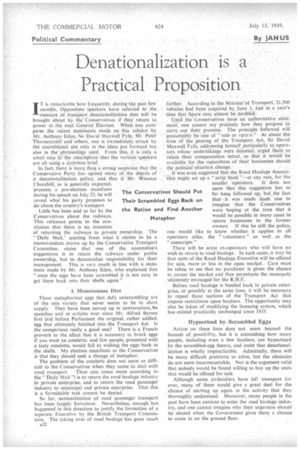Denationalization is a Practical Proposition
Page 10

If you've noticed an error in this article please click here to report it so we can fix it.
'T is remarkable how frequently, during the past few months, Opposition speakershave referred to the . measure of .transport •denationalization that will he brought about by the Conservatives if they °return. to power at the next General Election. When one cornr. pares the recent statements made on this subject.by .Mr. Anthony. Eden,' Sir David -MaxWelliFyfe, Mr: Pete . Thorneycrok and Others; one is im;nediately struck by the resemblance nbt only in the ideas put forWard hilt also in the phraseology used. From this, it is Only a. small step to the assumption that the various -speakers are all using a Comrnon'•brief.
In fact, there is more than a strong suspicion that the .Conservative Party has agreed .many of the details of it denationalization, policy, and that if 'Mr. Winston Churchill, 'as is generally -expected,
presents a pre-election manifesto during his speech on July 23, he will reveal what his Party proposes to do about the country's transport.
Little has been said so far by the Conservatives about the railways. This reticence points to the conclusion that there is no intention of returning the railways to private ownership. The . "Daily Mail,' quoting from what it claims to be a memorandum drawn up by the conservative Transport Committee, states that one of the committee's suggestions is to retain the railways under public ownership, but to decentralize responsibility for their management. This is very much in line with a statement made by Mr. Anthony -Eden, who explained that "once the eggs have been scrambled it is not easy to • get them back into their shells again."
• ,
A Monotonous Diet
These metaphorical eggs that defy unscrambling are of the one variety that never seems to be in short. supply. They have been served up in conversation,ln speeches and in articles ever since Mr. Alfred Barnes first laid before Parliament the original, rather addled, egg that ultimately hatched into the Transport Act. Is the comparison really a good one? There is a French proverb to the effect that it is necessary to break eggs if you want an omelette; and few people, presented with a tasty omelette, would fall to wishing the eggs back in the shells. My election manifesto to the Conservatives is that they should seek a change of metaphor.
The problem of the omelette does not seem so difficult to the Conservatives when they come to deal with road transport. Their aim (once more according to the" Daily Mail ") is to return the road haulage industry to private enterprise, and to return the road passenger industry to mUnicipal and private enterprise. That this is a formidable task cannot be denied.
So far, nationalization of road passenger transport has been largely fortuitous. Nevertheless, enough has happened in this direction to justify the formation of a separate Executive by the British Transport Commission. The taking over of road haulage has gone much
n32 further. According to the Minister ot Transport, 21,500 Vehicles had been acquired by June 1, and in a year time that figure may almost be doubled. ' .
Until the Conservatives issue ad authoritative statement; one cannot say precisely how they propose to carry out their promise. The principle-followed will presumably be one of " sale or rettiln." At about the time of the passing of the Transport Act, Sir David Maxwell Pyfe, addressing himself particularly to operators whose undertakings were doomed, urged them. to retain their compensation intact, so that it would be available for the repurchase of their businesses should
the political situation change. '
It was even suggested that the Road Haulage Association might set up a" scrip bank "—at any rate, for the smaller operators. , It does not seem that this suggestion has so" far been followed .up, but the fact that it was madeleads one to imagine that the Conservatives were hoping at the time that it would be possible in many cases to return businesses to the former owners -If this be still the policy, to know whether it applies to all the " volunteers " as well, as the one would like operators alike. " conscripts"
.There will be some ex-operators who will have no wish to return to road-haulage. In such cases, it may be that units of the Road Haulage Executive will be offered for sale, more or less in the open market. Care must be taken to see that no purchaser is given the chance to corner the market and thus perpetuate the monopoly , ultimately envisaged for the R.H.E.
Before road haulage is handed back to .private enterprise, or possibly at the same time, it will be necessary to repeal those sections of the Transport Act that impose restrictions upon hauliers. The opportunity may also be taken of modifying the licensing system, which has existed practically unchanged since 1933.
Hypnotized by Scrambled Eggs
Action on these lines does not seem beyond the bounds of possibility, but it is astonishing how many people, including even a few hauliers, are hypnotized by the scrambled-egg theory, and insist that denationalization is wholly impracticable. Admittedly, there will be Many difficult problems to solve, but the obstacles do not seem insurmountable. Nor is the argument valid that nobody would be found willing to buy up the units that would be offered for sale.
Although some ex-hauliers have left transport for ever, many of them would give a great deal for the chance of starting up again in the activity that they thoroughly understand. Moreover, many people in the past have been anxious to enter the road haulage industry, and one cannot imagine why their eagerness should be abated when the Government gives them a chance to come in on the ground floor.


























